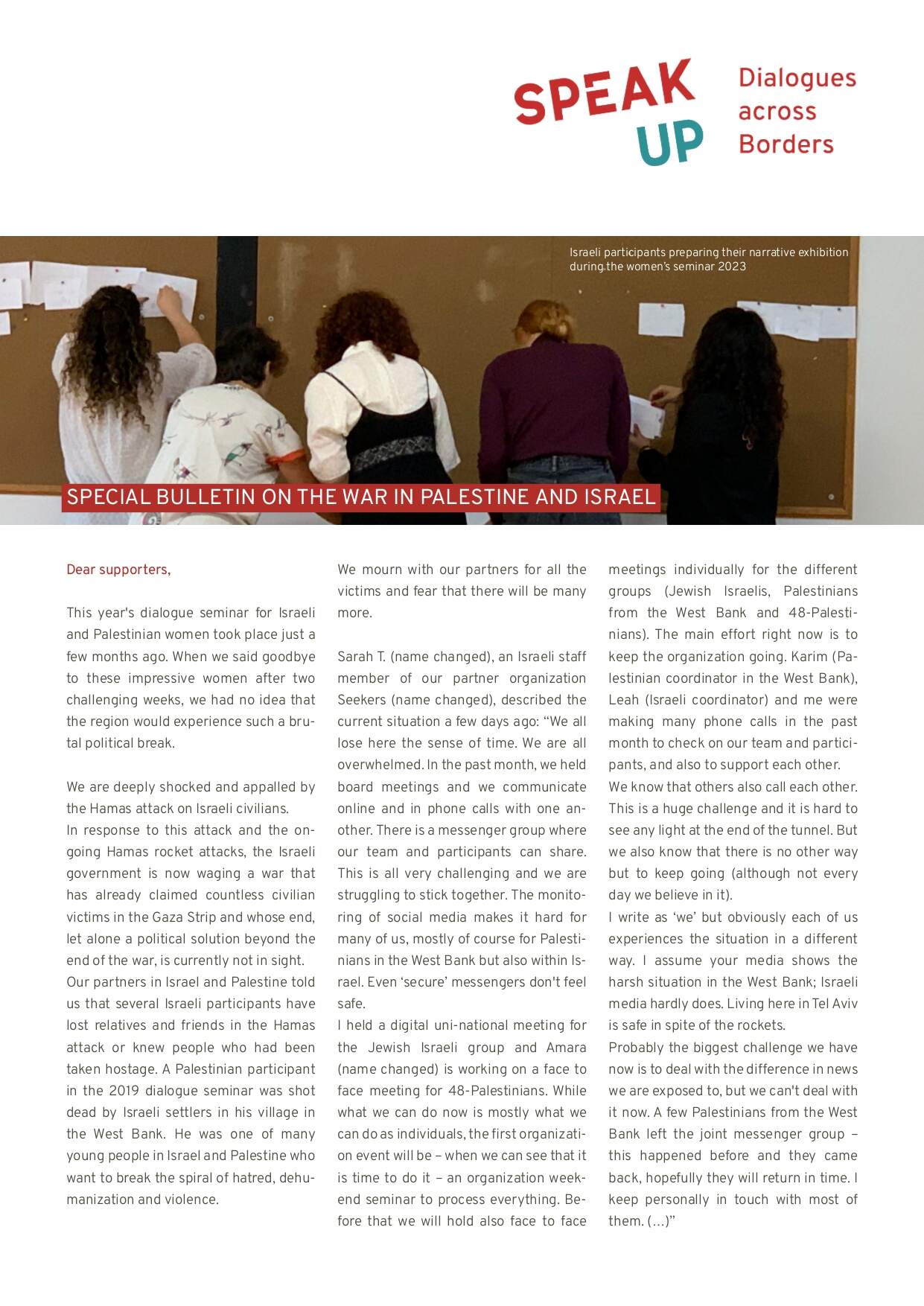
This year’s dialogue seminar for Israeli and Palestinian women took place just a few months ago. When we said goodbye to these impressive women after two challenging weeks, we had no idea that the region would experience such a brutal political break. We are deeply shocked and appalled by the Hamas attack on Israeli civilians.
In response to this attack and the ongoing Hamas rocket attacks, the Israeli government is now waging a war that has already claimed countless civilian victims in the Gaza Strip and whose end, let alone a political solution beyond the end of the war, is currently not in sight.
Our partners in Israel and Palestine told us that several Israeli participants have lost relatives and friends in the Hamas attack or knew people who had been taken hostage. A Palestinian participant in the 2019 dialog seminar was shot dead by Israeli settlers in his village in the West Bank. He was one of many young people in Israel and Palestine who want to break the spiral of hatred, dehumanization and violence. We mourn with our partners for all the victims and fear that there will be many more.
Sarah T. (name changed), an Israeli staff member of our partner organization Seekers (name changed), described the current situation a few days ago: “We all lose here the sense of time. We are all overwhelmed. In the past month, we held board meetings and we communicate online and in phone calls with one another. There is a messenger group where our team and participants can share. This is all very challenging and we are struggling to stick together. The monitoring of social media makes it hard for many of us, mostly of course for Palestinians in the West Bank but also within Israel. Even “secure” messengers don’t feel safe. I held a digital uni-national meeting for the Jewish Israeli group and Amara (name changed) is working on a face to face meeting for 48-Palestinians. While what we can do now is mostly what we can do as individuals, the first organization event will be – when we can see that it is time to do it – an organization weekend seminar to process everything. Before that we will hold also face to face meetings individually for the different groups (Jewish Israelis, Palestinians from the West Bank and 48-Palestinians). The main effort right now is to keep the organization going. Karim (Palestinian coordinator in the West Bank), Leah (Israeli coordinator) and me were making many phone calls in the past month to check on our team and participants, and also to support each other. We know that others also call each other. This is a huge challenge and it is hard to see any light at the end of the tunnel. But we also know that there is no other way but to keep going (although not every day we believe in it). I write as ‘we’ but obviously each of us experiences the situation in a different way. I assume your media shows the harsh situation in the West Bank; Israeli media hardly does. Living here in Tel Aviv is safe in spite of the rockets. Probably the biggest challenge we have now is to deal with the difference in news we are exposed to, but we can’t deal with it now. A few Palestinians from the West Bank left the joint messenger group – this happened before and they came back, hopefully they will return in time. I keep personally in touch with most of them. (…)”
Sarah’s short statement gives a painful account of the depth of the cut this war implies: it is a crucial test also for activists who have been working together for decades.
Whether and how “dialogue across borders” is possible in this situation within the framework of dialogue seminars, as we have been organizing in Germany since 2002 (after the “First Intifada”, in a situation also marked by violence), we do not know at the moment. However, even in these painful times, there are still people on both sides who find strength in staying in contact with the “other side” and working together towards non-violence and understanding. We are more convinced than ever that it is these direct human interactions that can help to overcome hatred and hostility and to fight for the chance of a non-violent future. It is precisely these efforts that we want to further strengthen and support right now.
We have therefore decided, despite all uncertainty about developments on the ground, to keep the possibilities open for dialogues and meetings in the coming summer and to reserve accommodation and flights, for example.
We are in regular contact with our partners and will be discussing their needs over the coming months, finding out what opportunities they see to organize encounters in 2024 and what such activities could look like in order to have an empowering effect during this time, which surely is (re-)traumatizing for both sides.
We will continue to stand consistently in solidarity with all those in Israel and Palestine who are working non-violently for a just future in which everyone can live in security.
